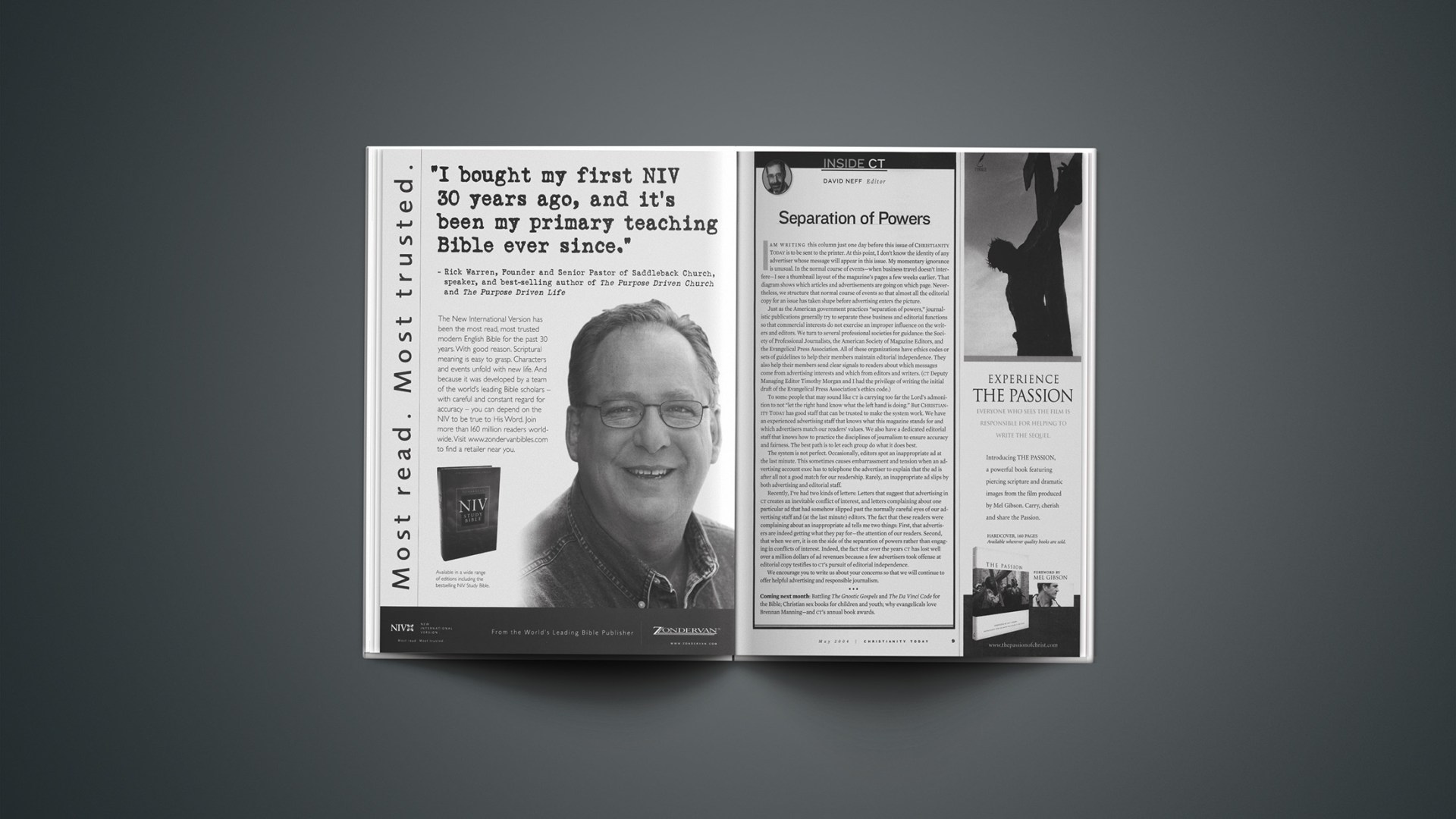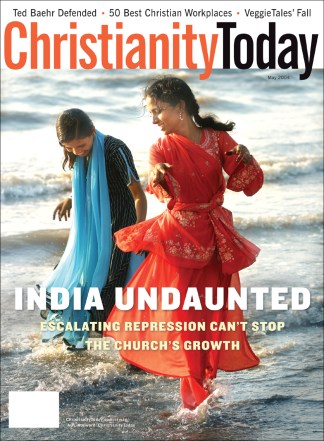I am writing this column just one day before this issue of Christianity Today is to be sent to the printer. At this point, I don’t know the identity of any advertiser whose message will appear in this issue. My momentary ignorance is unusual. In the normal course of events—when business travel doesn’t interfere—I see a thumbnail layout of the magazine’s pages a few weeks earlier. That diagram shows which articles and advertisements are going on which page. Nevertheless, we structure that normal course of events so that almost all the editorial copy for an issue has taken shape before advertising enters the picture.
Just as the American government practices “separation of powers,” journalistic publications generally try to separate these business and editorial functions so that commercial interests do not exercise an improper influence on the writers and editors. We turn to several professional societies for guidance: the Society of Professional Journalists, the American Society of Magazine Editors, and the Evangelical Press Association. All of these organizations have ethics codes or sets of guidelines to help their members maintain editorial independence. They also help their members send clear signals to readers about which messages come from advertising interests and which from editors and writers. (CT Deputy Managing Editor Timothy Morgan and I had the privilege of writing the initial draft of the Evangelical Press Association’s ethics code.)
To some people that may sound like CT is carrying too far the Lord’s admonition to not “let the right hand know what the left hand is doing.” But Christianity Today has good staff that can be trusted to make the system work. We have an experienced advertising staff that knows what this magazine stands for and which advertisers match our readers’ values. We also have a dedicated editorial staff that knows how to practice the disciplines of journalism to ensure accuracy and fairness. The best path is to let each group do what it does best.
The system is not perfect. Occasionally, editors spot an inappropriate ad at the last minute. This sometimes causes embarrassment and tension when an advertising account exec has to telephone the advertiser to explain that the ad is after all not a good match for our readership. Rarely, an inappropriate ad slips by both advertising and editorial staff.
Recently, I’ve had two kinds of letters: Letters that suggest that advertising in CT creates an inevitable conflict of interest, and letters complaining about one particular ad that had somehow slipped past the normally careful eyes of our advertising staff and (at the last minute) editors. The fact that these readers were complaining about an inappropriate ad tells me two things: First, that advertisers are indeed getting what they pay for—the attention of our readers. Second, that when we err, it is on the side of the separation of powers rather than engaging in conflicts of interest. Indeed, the fact that over the years CT has lost well over a million dollars of ad revenues because a few advertisers took offense at editorial copy testifies to CT‘s pursuit of editorial independence.
We encourage you to write us about your concerns so that we will continue to offer helpful advertising and responsible journalism.
Coming next month: Battling The Gnostic Gospels and The Da Vinci Code for the Bible; Christian sex books for children and youth; why evangelicals love Brennan Manning—and CT‘s annual book awards.
Copyright © 2004 Christianity Today. Click for reprint information.
Related Elsewhere:
The original article alleging a conflict of interest was a sidebar to a main article on Christian film reviewers.
Also posted today is Movieguide‘s response to “A Patent Conflict of Interest.”
Movieguide’s reviews are available online.
Other articles about Christians and the film industry include:
Todd Komarnicki: Producer, Director, Writer and Believer | The producer of Elf explains how his Christian faith affects his career as a Hollywood producer, director, and writer. (Nov. 13, 2003)
Exegeting The Matrix | A lot of spiritual stuff went into the Matrix films, but not as much as some authors think. (Nov. 06, 2003)
Two Weddings and a Baptism | It’s still impossible to predict what will advance the gospel in Hollywood. (Oct. 15, 2003)
Clean Flicks, Illegal Flicks? | Hollywood directors file suit against CleanFlicks.
What Is Hip? | Let’s not kid ourselves that salvation depends on the ability to discuss Austin Powers movies. (Dec. 05, 2002)
Let’s Get Metaphysical at the Damah Film Festival | Festival celebrates directors who explore spiritual experiences. (Nov. 07, 2002)










